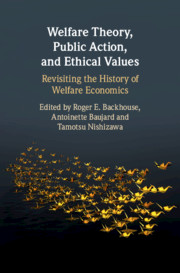Book contents
- Welfare Theory, Public Action, and Ethical Values
- Welfare Theory, Public Action, and Ethical Values
- Copyright page
- Contents
- Figures and Tables
- Contributors
- Acknowledgements
- Introduction: Revisiting the History of Welfare Economics
- Part I Plurality of Welfare in the Making of Welfare Economics
- 1 Ruskin’s Romantic Triangle
- 2 Radicalism versus Ruskin
- 3 Alfred Marshall on Progress and Human Wellbeing
- 4 Pigou’s Welfare Economics Revisited
- 5 To Which Kind of Welfare Did Léon Walras Refer?
- 6 Value Judgement within Pareto’s Economic and Sociological Approaches to Welfare
- Part II Developing Modern Welfare Economics
- Index
- References
6 - Value Judgement within Pareto’s Economic and Sociological Approaches to Welfare
from Part I - Plurality of Welfare in the Making of Welfare Economics
Published online by Cambridge University Press: 04 March 2021
- Welfare Theory, Public Action, and Ethical Values
- Welfare Theory, Public Action, and Ethical Values
- Copyright page
- Contents
- Figures and Tables
- Contributors
- Acknowledgements
- Introduction: Revisiting the History of Welfare Economics
- Part I Plurality of Welfare in the Making of Welfare Economics
- 1 Ruskin’s Romantic Triangle
- 2 Radicalism versus Ruskin
- 3 Alfred Marshall on Progress and Human Wellbeing
- 4 Pigou’s Welfare Economics Revisited
- 5 To Which Kind of Welfare Did Léon Walras Refer?
- 6 Value Judgement within Pareto’s Economic and Sociological Approaches to Welfare
- Part II Developing Modern Welfare Economics
- Index
- References
Summary
Pareto’s advocacy of ‘ethical neutrality’ in social science is well known, but, over the course of his scholarly career, he devoted more and more attention to accommodating the influence of sentiment (value judgement) within welfare theory. This paper plots Pareto’s evolving treatment of value judgement from his early economic works on production efficiency and collective economic welfare through to his mature sociological reflections on collective social welfare. Within that context, Pareto’s contribution to the ‘new welfare economics’, as a stream of what John Hicks called economic welfarism, is discussed; as is his attempt to accommodate the values of each individual member of society within his sociological approach to collective welfare. However, in contrast to the position taken under Hicks’s conception of non-welfarism, the policy advisor who adopts Pareto’s sociology of welfare is still obliged to follow an ethically neutral position when considering the values of individuals to provide advice on improving social welfare.
- Type
- Chapter
- Information
- Welfare Theory, Public Action, and Ethical ValuesRevisiting the History of Welfare Economics, pp. 135 - 156Publisher: Cambridge University PressPrint publication year: 2021

